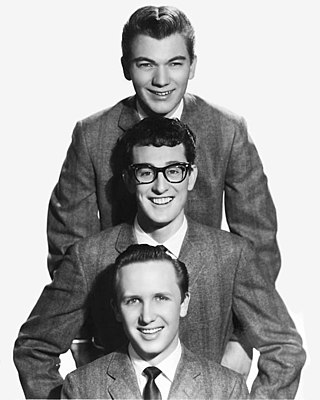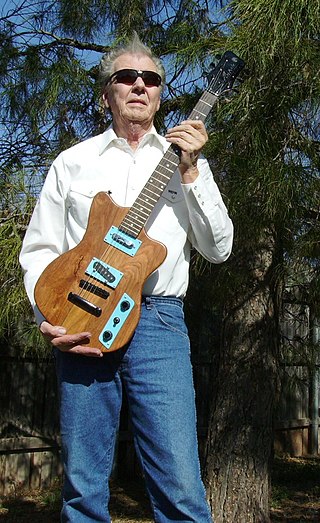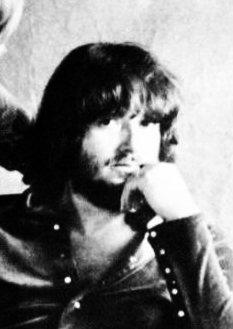
Charles Hardin Holley, known as Buddy Holly, was an American singer and songwriter who was a central and pioneering figure of mid-1950s rock and roll. He was born to a musical family in Lubbock, Texas, during the Great Depression, and learned to play guitar and sing alongside his siblings. Holly's style was influenced by gospel music, country music, and rhythm and blues acts, which he performed in Lubbock with his friends from high school.

Glen Dee Hardin is an American piano player and arranger. He has performed and recorded with such artists as Roy Orbison, Elvis Presley, Emmylou Harris, John Denver, and Ricky Nelson.

The Crickets were an American rock and roll band from Lubbock, Texas, formed by singer-songwriter Buddy Holly in January 1957. Their first hit record, "That'll Be the Day", released in May 1957, peaked at number three on the Billboard Top 100 chart on September 16, 1957. The sleeve of their first album, The "Chirping" Crickets, shows the band line-up at the time: Holly on lead vocals and lead guitar, Niki Sullivan on rhythm guitar, Jerry Allison on drums, and Joe B. Mauldin on bass. The Crickets helped set the template for subsequent rock bands, such as the Beatles, with their guitar-bass-drums line-up, performing their own material. After Holly's death in 1959, the band continued to tour and record into the 1960s and beyond with other band members through to the 21st century.

"That'll Be the Day" is a song written by Buddy Holly and Jerry Allison. It was first recorded by Buddy Holly and the Three Tunes in 1956 and was re-recorded in 1957 by Holly and his new band, the Crickets. The 1957 recording achieved widespread success. Holly's producer, Norman Petty, was credited as a co-writer, although he did not contribute to the composition.

Jerry Ivan Allison was an American musician. He was best known as the drummer for the Crickets and co-writer of their hits "That'll Be the Day" and "Peggy Sue", recorded with Buddy Holly. His only solo chart entry on the Billboard Hot 100 was "Real Wild Child", issued in 1958 under the name Ivan. Allison was inducted into the Rock and Roll Hall of Fame in 2012.

Joseph Benson Mauldin, Jr. was an American bassist, songwriter, and audio engineer who was best known as the bassist for the early rock and roll group the Crickets. Mauldin initially played a double (standup) bass, then switched to a Fender Precision Bass guitar. After several years with the Crickets, he became a recording engineer at Gold Star Studios, the Los Angeles studio which became the "hit factory" for Phil Spector, Brian Wilson, and other major 1960s rock performers.

Eric Clapton is the debut solo studio album by English rock musician Eric Clapton, released in August 1970 by Atco and Polydor Records.

Delaney & Bonnie was an American duo of singer-songwriters Delaney Bramlett and Bonnie Bramlett. In 1969 and 1970, they fronted a rock/soul ensemble, Delaney & Bonnie and Friends, whose members at different times included Duane Allman, Gregg Allman, Eric Clapton, George Harrison, Leon Russell, Bobby Whitlock, Dave Mason, Steve Howe, Rita Coolidge, and King Curtis.
Sonny Curtis is an American singer and songwriter. Known for his collaborations with Buddy Holly, he was a member of the Crickets and continued with the band after Holly's death. Curtis's best known compositions include "Walk Right Back", a major hit in 1961 for the Everly Brothers; "I Fought the Law", notably covered by the Bobby Fuller Four and the Clash; and "Love is All Around," the theme song for The Mary Tyler Moore Show.

Joseph Sonny West was an American songwriter and musician, best known as the co-writer of two of Buddy Holly's biggest hits: "Oh, Boy!" and "Rave On".

Eric Clapton at His Best is a two-LP compilation of Eric Clapton's work after he left his earlier band Cream, released in September 1972. It was concurrently released with a two-LP compilation of Cream tracks, Heavy Cream, along with "at His Best" solo retrospectives by Cream's other members Jack Bruce and Ginger Baker.

Delaine Alvin "Delaney" Bramlett was an American singer and guitarist. He was best known for his musical partnership with his wife Bonnie Bramlett in the band Delaney & Bonnie and Friends, which included a wide variety of other musicians, many of whom were successful in other contexts.
Jerry Naylor Jackson was an American country and rock and roll artist, broadcaster and inspirational speaker. From late 1961 through 1964 he was The Crickets' lead vocalist.

In Style With the Crickets is a rock and roll album by the Crickets. Although it was the band's first release following the departure and subsequent death of their front man, Buddy Holly, it still contains many of the band's most memorable songs and many tracks have also been featured on numerous compilations over the years. Originally released as an LP record on December 5, 1960, the album remained out of print for some time until it was re-released on CD in 1993, with bonus tracks not featured on the original album.

"Let It Rain" is a song and single written and released by the British rock musician Eric Clapton and Bonnie Bramlett; it appears on his 1970 debut studio album Eric Clapton. In 1972 it was released as a single as part of the promotion for his compilation album Eric Clapton at His Best

Bobby Vee Meets The Crickets is a cross-over rock and roll album that brings singer Bobby Vee together with the Crickets. It was Vee's 7th album and The Crickets' second release following the departure and subsequent death of their front man, Buddy Holly. The album contains new versions of three songs written by or recorded by Holly—Peggy Sue, Bo Diddley, and Well...All Right—and a host of cover versions of 1950s rock'n'roll songs by artists like Little Richard and Chuck Berry. Originally released as an LP record on July 14, 1962, the album was re-released on CD in 1991, with bonus tracks not featured on the original album.

Something Old, Something New, Something Blue, Somethin' Else is a rock and roll album by the Crickets. It is The Crickets' third release following the departure and subsequent death of their front man, Buddy Holly. As the original cover indicates, the album contains versions of four old songs, four new songs, and four songs with variations of "blue" in the title.

California Sun / She Loves You is a rock and roll album by the Crickets, recorded during their time with Liberty Records. It is The Crickets' fourth and final album for Liberty following the departure and subsequent death of their front man, Buddy Holly. The album's title is somewhat confusing, as it follows the then-popular industry practice of filling the album cover with the titles of as many popular songs as possible. The record label simply lists "The Crickets" name.

A Collection is a rock and roll compilation album by the Crickets, gathering singles recorded between 1962 and 1965 for Liberty Records.

"When You Ask About Love" is a song written by Jerry Allison and Sonny Curtis and recorded by the Crickets in 1959. It was a hit in Britain, reaching number 27 in the UK Singles Chart.

















